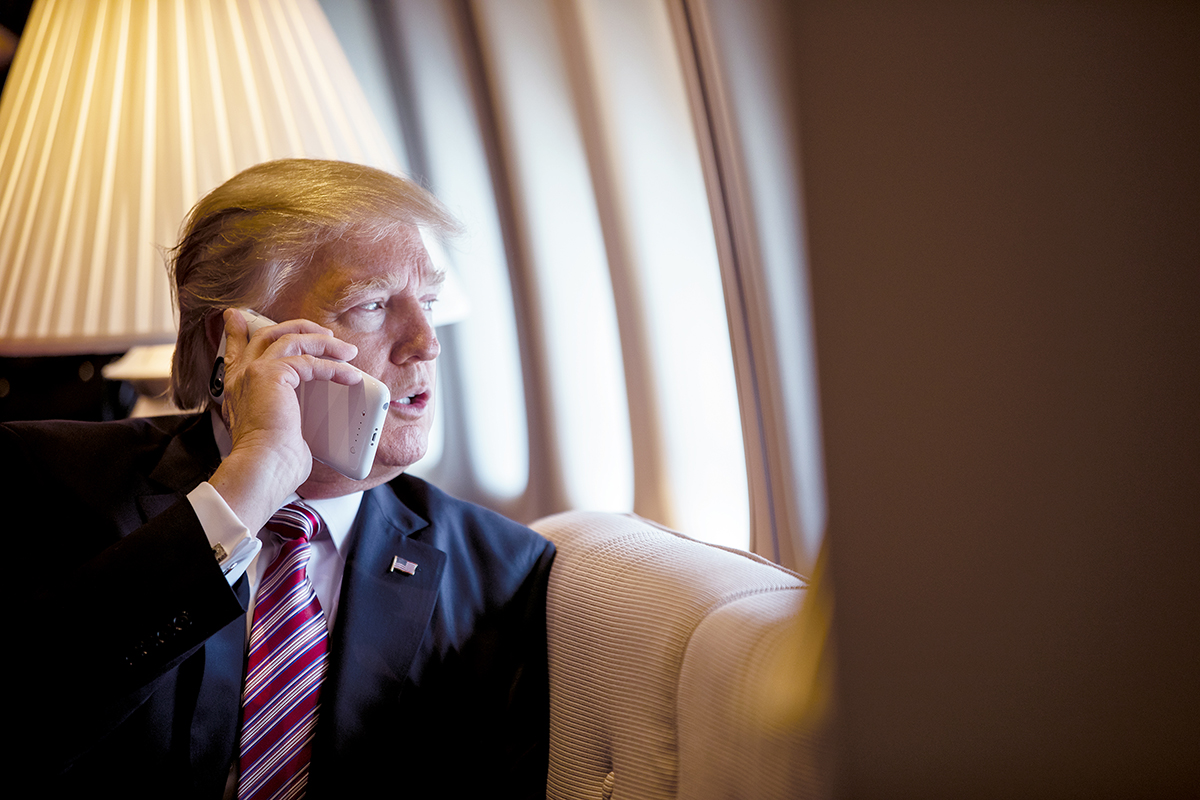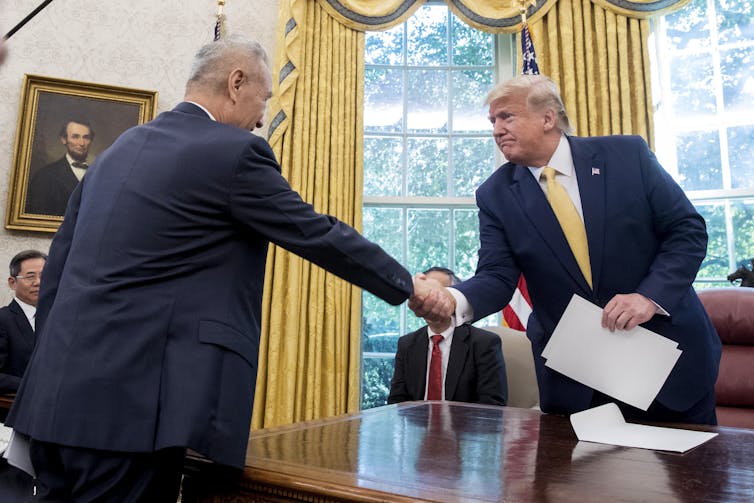says the U.S. president’s simultaneous moves — one outside international law, the other inside it — show that his approach to trade is not so much anti-establishment as it is opportunistic.

President Donald Trump. (White House/Shealah Craighead)
Just as America’s trade war with China may be winding down, its troubles with Europe seem to be growing.
On Oct. 11, President Donald Trump said that the United States and China had agreed, in principle, to “phase one” of a trade deal. Although the details are murky, the deal appears to suggest small wins for both sides and a cessation – for now – in tariff escalation.
Three days later, the U.S. imposed US$7.5 billion of sanctions on European Union products – such as Scotch whiskey and French cheese – to protest the EU’s subsidies of aviation giant Airbus.
But there is one notable difference between these two conflicts.
Trump has been managing the dispute with China largely outside the international legal framework regulating trade. Though he has employed various justifications for his actions, many experts agree that they violate international law. By contrast, Trump’s European tariffs were sanctioned by the World Trade Organization. They are thus indisputably legal.
As a scholar of trade policy, these two simultaneous moves – one outside international law and the other inside it – fascinate me. They show that Trump’s approach to trade is not so much anti-establishment as it is opportunistic.
Tale of Two Trade Talks
The deal with China, which that country hasn’t yet formally endorsed, appears to include a promise by Beijing to purchase up to $50 billion of additional U.S. agricultural products and to revisit its foreign investment and intellectual property laws.
In return, the White House has suspended the imposition of its threatened tariff hikes, which had been due to take place on Oct. 15.
Trump claims to have achieved more success with his aggressive stance during the 18-month trade war than prior presidents could boast when playing by the rules. It is ironic, then, that his trade sanctions against Europe resulted from over a decade of work by previous administrations and stuck to the book.
The United States has long maintained that European countries subsidize Airbus, while the European Union has claimed that Washington uses defense spending to do the same for Boeing. The EU may soon get permission from the WTO to impose its own trade sanctions on U.S. products if that case goes the way it is expected to.

(AP/Andrew Harnik)
‘Forum Shopping’
So why is the U.S. following the rules in one case but flouting them in another? Put simply, I believe Trump is “forum shopping.”
Forum shopping is a term coined by international relations theorists to explain why countries use varying international organizations, or none at all, to conclude similar deals. In all sorts of policy areas, these theorists argue, states will choose to negotiate in forums that they believe will stack the odds in their favor.
That’s why the U.S. chose to work within the rules on Europe — it knew they were on its side — but beyond them in dealing with China.
In the Europe dispute, the issue is quite definable: The EU’s Airbus subsidies are a likely violation of global trade rules.
For this reason, the administration has evidently concluded that the smart approach is to follow through with the legal process.
The China dispute is different. It encompasses a wide range of issues — from intellectual property theft to currency manipulation — that would be difficult to adjudicate comprehensively. More to the point, the key Trump complaint — the trade imbalance — is not in itself even a violation of international trade law.
The legal route would have taken a long time and may well have gone nowhere. Given Trump’s political need to confront China, such an approach was too risky to consider.
Long-term Consequences
But forum shopping has costs.
When even the principal architect of the international trading rules — the United States — only appeals to those rules in search of its own interests, the system’s legitimacy is eroded.
Why should Americans care?
There is a reason that the development of an international trading system has been backed by Washington for seven decades — it is extremely useful.
Having a level playing field in trade, based on clear rules, open information and non-discrimination has played a key role in American, and global, economic growth. It has also encouraged interdependence and reduced conflict. Chucking that system for a quick result as Trump has done in the case of China is a mistake.
Ultimately, for legal norms to function, I believe leading players like the U.S., China and the EU must all adopt a more enlightened, long-term view of their interests. They must be willing to recognize the authority of international rules even if they are tempted to ignore them in individual cases.
Let’s hope that future presidents will take a broader view and recognize America’s interests in a rule-based, cooperative international system, both in the trade arena and beyond.
Charles Hankla is associate professor of political science at Georgia State University.
This article is republished from The Conversation under a Creative Commons license. Read the original article.
Before commenting please read Robert Parry’s Comment Policy. Allegations unsupported by facts, gross or misleading factual errors and ad hominem attacks, and abusive or rude language toward other commenters or our writers will be removed. If your comment does not immediately appear, please be patient as it is manually reviewed. For security reasons, please refrain from inserting links in your comments.

I’m not familiar with this writer, Prof. Charles Hankla. As I read this the posture of his argument brought to mind the lengthy and finally failed negotiation of the TPP. That effort followed, at least outwardly, all of the legalistic requirements he alludes to. My objection then, and still to this day, was the inclusion of the poison pill of the dispute resolution process and un-elected, un-regulated, and non-accountable body that would decide and make decisions about “fairness.” “Fairness” that is determined by the “rights” of capital, investment, and profit.
Through the operation of a “legal” process, we all were in danger of losing our sovereignty as villages, towns, cities, and even States. In short it was an attack by one institution – global commercialism and capitalism – on another, the sovereignty and home-rule rights of communities of all that would be signatories to that agreement. There is a space as wide as the Pacific between what is “legal” and what is just, right, and non-exclusionary.
Seems we have a conflict between fair and free trade and who determines what is fair. Clearly financial investors, many here in America like the idea of having the freedom to invest where profits are the greatest and are the loudest trumpeters of free trade, i.e. the freedom to move their capital to maximize profits. Although we often here it is good for ordinary American workers, that is not always the case and explains why their is worker support Trump’s position on foreign trade.
The danger of a more bi-lateral system of trade is evidenced by our cruel use of sanctions, that trade can be used as a weapon which common sense tells you hurt ordinary people more than the people they claim to target. The silence among our leaders and information purveyors that they violate international law is deafening. Recently a prominent New York Times writer referred to the sanctions against Venezuela as well meaning. He did express concern that they might be hurting ordinary people. I think he began “While the sanctions may be well meaning but..”
I’m sorry, this is not rocket science. Yet no one in the press of any kind can see the fact that the Western Empire headquartered in the USA it at war with the rest of the world – all of it.
Step back, look at the whole globe the Empire is slaughtering innocent people all over the Middle East, all over Latin America, the empire has troops in 52 of the 54 African nations. The US has military personnel in over 100 countries and is using “kinetic force” (slaughter of innocents) in over 60 countries right now today.
This global butchery started the day after the atomic bombs were dropped (for purely political purposes) and has not stopped – 75 years of NO-STOP SLAUGHTER.
The historical record is clear and indisputable regarding the perpetual war waged on the peoples of the world by the Western Empire EVERY SINGLE DAY FOR 75 YEARS.
And here’s the kicker – every single “democracy” in Scandinavia, Europe or the North American “democracies” has at one time in its history been Imperial – every democracy.
The US headquartered global empire is just a consolidation of all the previous democratic empires with much of the wealth still intact.